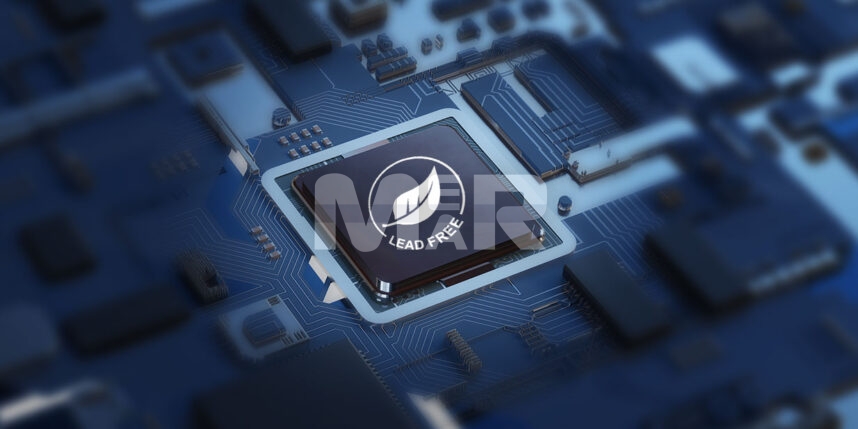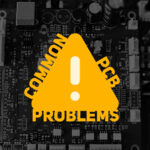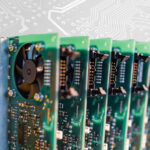Top materials to consider while manufacturing lead-free PCB!

If you are to comply with the RoHS directive, you need to select lead-free PCB manufacturing material. The directive limits the use of the following:
- Cadmium
- Mercury
- Polybrominated biphenyls
- Hexavalent Chromium
- Polybrominated biphenyl ethers
In choosing the right lead-free material you need to check for several things including:
- The ability of the material to withstand elevated temperatures.
PCB materials that comply with the RoHS directives need to use a lead-free solder paste and undergo a soldering process at high temperature. This requires the PCB material to have the following properties:
- High glass transition temperature
- High PCB decomposition temperature
-
Low thermal expansion coefficient
- Compatibility of solder and PCB pad coatings.
- Low dielectric loss.
- Low dielectric constant.
- High insulation resistance.
- Low water absorption.
YOU MAY ALSO LIKE: What is RoHS Compliance
SELECTING A LEAD-FREE PCB MATERIAL
Depending on the complexity of the product, a PCB needs to have a large number of layers, high component density, large surface area and more. The reliability of these boards has a lot to do with the choice of the right PCB material. The following thumb rules based on the product function and performance come in handy to ensure reliability of lead-free PCBs:
- Lead-free FR-4 epoxy glass fiber substrate works well for general electronic products.
- High TG FR-4 material works well for complex electronic products.
- Lead-free FR-5 material is appropriate for high-reliability electronic products.
- Lead-free CEM-1 and CEM-3 materials work well for low-cost electronic products.
- Flexible PCBs use polyimide glass fiber substrate.
- High-reliability circuit boards need metal substrates.
- For high-frequency circuit boards Teflon glass fiber substrates work best.
LEAD-FREE LAMINATES
It is also important to select high-temperature laminates in order to meet the high-temperature cycling requirements especially as some lead-free PCB assembly processes require the laminate to withstand temperatures in excess of 260 °C for extended periods of time.
Some of the popular lead-free PCB laminates include:
- 370 HR
- 370 TURBO
- FR406
- FR406HR
- FR408
- FR408HR
- G200
- GETEK
- GI-180 / G-200
- IS410
- IS415
- IS420
- IS620/IS620i
-
IS680
- IS-680 3.33
- IS-680 3.00
- IS-680 3.38
- IS-680 2.80
- IS-680 3.20
- IS-680 3.45
- P95
- P96
- P26
- P26N
LEAD-FREE SOLDERMASK AND SURFACE FINISH
Lead-free PCBs necessitate the use of solder masks containing chlorine. Halogen-free solder masks are also widely used in the case of lead-free PCBs.
The surface finish plays a crucial role in the PCB as it prevents the copper from oxidation and thereby ensures high performance. The surface finish is also essential in making a reliable connection between the PCB and the components. It is imperative, therefore, that the choice of the surface finish be made with the same level of dexterity as in choosing the right material for the bare board.
Some of the lead-free surface finishes that are increasingly used, include:
- Electroless Nickel Immersion Gold or ENIG.
- Electroless Nickel Electroless Palladium Immersion Gold or ENEPIG.
- Electrolytic Nickel/Gold.
- Immersion Silver.
- White Tin or Immersion Tin.
- Lead Free HASL.
- Organic Solderability Preservatives or OSP.
A wide variety of factors such as the cost, the operating environment, shelf life, production volume and throughput are some of the other factors that impact the choice of the surface finish.
TO SUM UP
It is imperative that the board of designers provide specific information in the purchase order confirming the material type, the final finish and requirement for RoHS compliance. This will ensure that the right products are used that support recycling and reuse along with meeting legislative directives. In fact, it is time for the industry to step up to eliminate hazardous materials from PCBs. This not only means phasing out a lead but also being proactive in recognizing materials that may not be prohibited yet but do not have a stellar reputation. With sustained efforts, not just the use of lead but other hazardous elements can also be done away with. That will mean not just saving the environment but also not scrambling to meet deadlines to do with the banning of hazardous substances. Choosing the right PCB partner is therefore of utmost importance as their expertise and experience can go a long way in making the right choice of material.
At Mermar Electronics, we specialize in providing lead-free and RoHS compliant PCB manufacturing services. Our high-quality lead-free PCBs are manufactured using environmentally friendly components. Our consistent quality and quick turnaround endear itself to our customers, who look on us as a one-stop-shop for all their PCB requirements. In case you have any questions or require more information about lead-free PCBs, contact us via sales@mermarinc.com or call us on (760) 244-6149.








